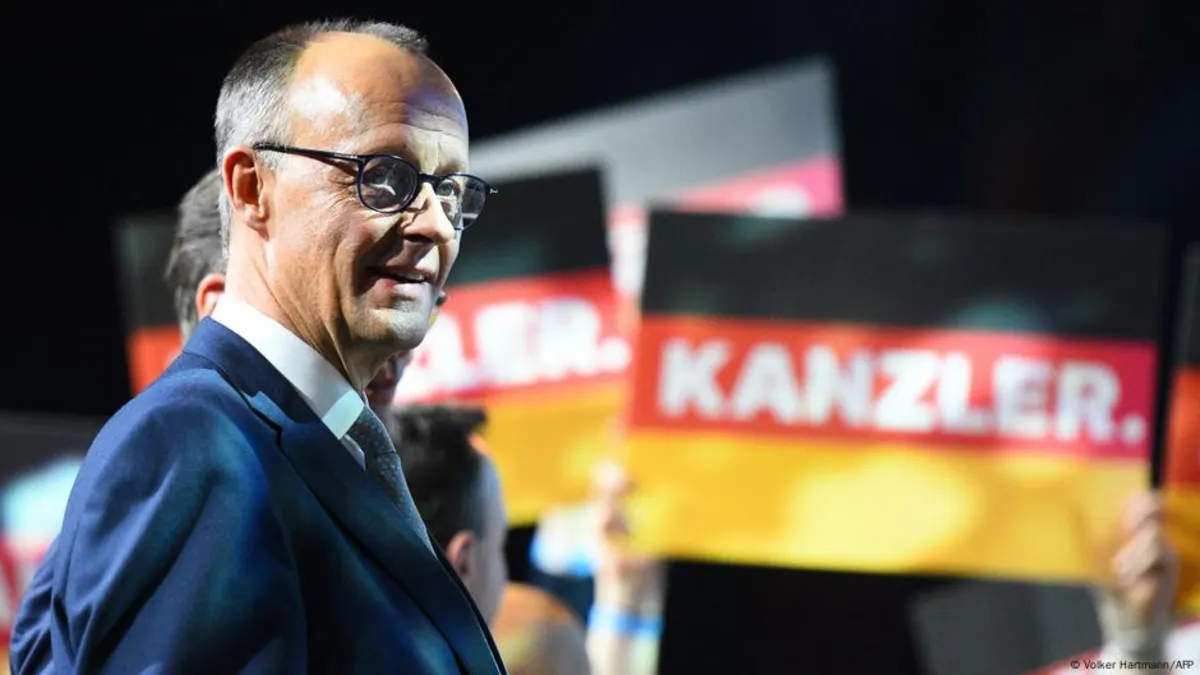
The conservative Union of the Christian Democrats (CDU) and its Bavarian sister party, the Christian Social Union (CSU), have won the 2025 federal election in Germany, securing Friedrich Merz as the next chancellor. "We won the 2025 federal election," enthused Merz, the CDU leader and Union's chancellor candidate, on election night in Berlin.
Despite the victory, celebrations at the party headquarters were muted as expectations were higher. The conservatives had aimed for a result of "30% plus X" but managed to secure about 28% of the vote. This outcome means that the CDU/CSU will need to find coalition partners to form a majority under Germany's electoral system.
The Alternative for Germany (AfD), which came in second place, could be a potential coalition partner based on numbers. The populist party, considered right-wing extremist by some, received the support of one in five German voters. "We have doubled! They wanted to halve us, but the opposite has happened," declared AfD co-leader Alice Weidel after the results were revealed.
However, the CDU/CSU has categorically ruled out forming a coalition with the AfD. "We have fundamental differences of opinion, for example in foreign policy, in security policy, in many other areas, on the topics of Europe, NATO, and the euro currency," reiterated Merz.
The campaign primarily focused on asylum policy and a weak economy. CSU head Markus Söder attributed the success of the AfD to the uncertainty among Germans. "People were not sure that the CDU/CSU would really implement their promises," he stated. Söder emphasized the need for a change of direction in Germany.
Potential coalition partners include the Social Democrats (SPD) and the Greens. Both parties, part of the previous government, suffered losses. The SPD experienced its worst election result since 1890 with about 16% of the vote. "That is a bitter election result for the Social Democratic Party," conceded Chancellor Olaf Scholz.
Scholz is notable for being the only German chancellor not to be reelected in the past five decades. His coalition with the Greens and the Free Democrats (FDP) ruled for less than three years before collapsing over budget disputes. Scholz announced he does not wish to hold a ministerial role if the SPD joins the new government.
The FDP, failing to clear the 5% voter support hurdle, will not be represented in the next Bundestag. FDP leader Christian Lindner announced his retirement from politics following the defeat. The Greens managed to contain their losses, with top candidate Robert Habeck expressing readiness to talk if needed for a coalition.
The Left Party, initially not considered a coalition option by the Union, made an unexpected comeback with more than 8% of the vote. This result was surprising given the party's struggle after the Sahra Wagenknecht Alliance (BSW) split in early 2024.
Regardless of the complex coalition negotiations that lie ahead, Germany's new government will face enormous challenges. "The world is not waiting for us, nor is it waiting for lengthy coalition talks and negotiations," stated Merz, emphasizing the need for quick government formation.
Economic growth and social service cuts are key priorities for Merz, as Germany faces its biggest economic crisis since reunification in 1990. The new government must finance future budgets amidst growing military spending, infrastructure restoration, and climate transformation.
This election was the first since Russia's major offensive against Ukraine in 2022, with Germany allocating significant resources to military support. With changes in the US administration under President Donald Trump, Europe must take greater responsibility for its defense.
The CDU aims for Germany to take a leadership role in Europe, collaborating with France, Poland, and a strong European Union. The new Bundestag must convene by March 25, and if a new government is not formed by then, the old one will continue in a caretaker role.
This article was originally written in German.